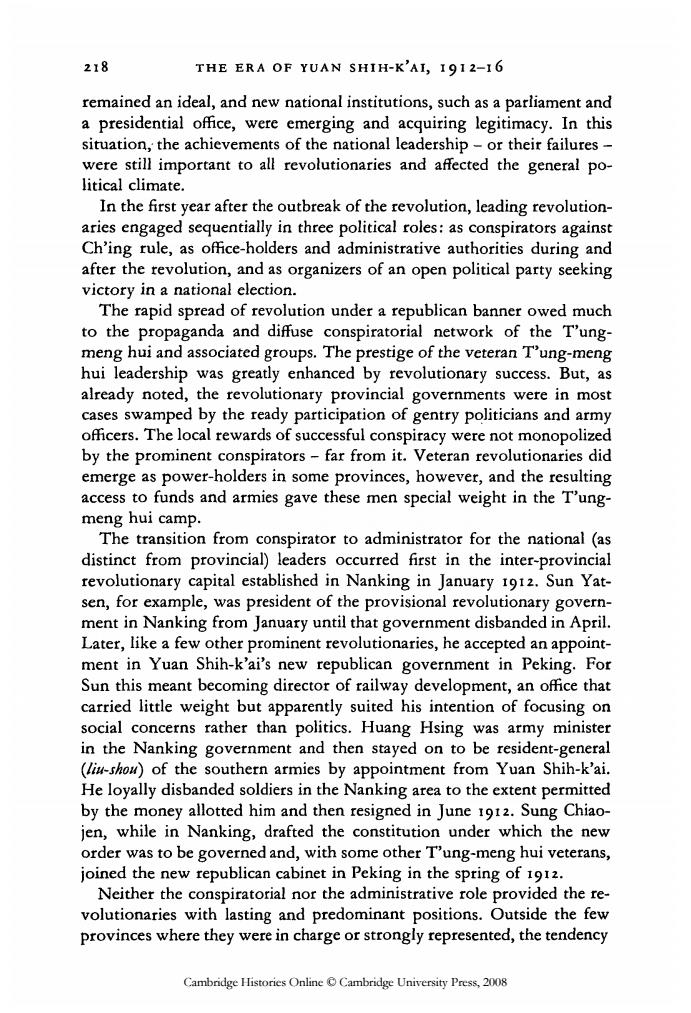正在加载图片...

218 THE ERA OF YUAN SHIH-K'AI,1912-16 remained an ideal,and new national institutions,such as a parliament and a presidential office,were emerging and acquiring legitimacy.In this situation,the achievements of the national leadership-or their failures- were still important to all revolutionaries and affected the general po- litical climate. In the first year after the outbreak of the revolution,leading revolution- aries engaged sequentially in three political roles:as conspirators against Ch'ing rule,as office-holders and administrative authorities during and after the revolution,and as organizers of an open political party seeking victory in a national election. The rapid spread of revolution under a republican banner owed much to the propaganda and diffuse conspiratorial network of the Tung- meng hui and associated groups.The prestige of the veteran Tung-meng hui leadership was greatly enhanced by revolutionary success.But,as already noted,the revolutionary provincial governments were in most cases swamped by the ready participation of gentry politicians and army officers.The local rewards of successful conspiracy were not monopolized by the prominent conspirators-far from it.Veteran revolutionaries did emerge as power-holders in some provinces,however,and the resulting access to funds and armies gave these men special weight in the Tung- meng hui camp. The transition from conspirator to administrator for the national (as distinct from provincial)leaders occurred first in the inter-provincial revolutionary capital established in Nanking in January 1912.Sun Yat- sen,for example,was president of the provisional revolutionary govern- ment in Nanking from January until that government disbanded in April. Later,like a few other prominent revolutionaries,he accepted an appoint- ment in Yuan Shih-k'ai's new republican government in Peking.For Sun this meant becoming director of railway development,an office that carried little weight but apparently suited his intention of focusing on social concerns rather than politics.Huang Hsing was army minister in the Nanking government and then stayed on to be resident-general (liu-shon)of the southern armies by appointment from Yuan Shih-k'ai. He loyally disbanded soldiers in the Nanking area to the extent permitted by the money allotted him and then resigned in June 1912.Sung Chiao- jen,while in Nanking,drafted the constitution under which the new order was to be governed and,with some other Tung-meng hui veterans, joined the new republican cabinet in Peking in the spring of 1912. Neither the conspiratorial nor the administrative role provided the re- volutionaries with lasting and predominant positions.Outside the few provinces where they were in charge or strongly represented,the tendency Cambridge Histories Online Cambridge University Press,20082l8 THE ERA OF YUAN SHIH-K'AI, I 9 I 2-1 6 remained an ideal, and new national institutions, such as a parliament and a presidential office, were emerging and acquiring legitimacy. In this situation, the achievements of the national leadership - or their failures - were still important to all revolutionaries and affected the general political climate. In the first year after the outbreak of the revolution, leading revolutionaries engaged sequentially in three political roles: as conspirators against Ch'ing rule, as office-holders and administrative authorities during and after the revolution, and as organizers of an open political party seeking victory in a national election. The rapid spread of revolution under a republican banner owed much to the propaganda and diffuse conspiratorial network of the T'ungmeng hui and associated groups. The prestige of the veteran T'ung-meng hui leadership was greatly enhanced by revolutionary success. But, as already noted, the revolutionary provincial governments were in most cases swamped by the ready participation of gentry politicians and army officers. The local rewards of successful conspiracy were not monopolized by the prominent conspirators - far from it. Veteran revolutionaries did emerge as power-holders in some provinces, however, and the resulting access to funds and armies gave these men special weight in the T'ungmeng hui camp. The transition from conspirator to administrator for the national (as distinct from provincial) leaders occurred first in the inter-provincial revolutionary capital established in Nanking in January 1912. Sun Yatsen, for example, was president of the provisional revolutionary government in Nanking from January until that government disbanded in April. Later, like a few other prominent revolutionaries, he accepted an appointment in Yuan Shih-k'ai's new republican government in Peking. For Sun this meant becoming director of railway development, an office that carried little weight but apparently suited his intention of focusing on social concerns rather than politics. Huang Hsing was army minister in the Nanking government and then stayed on to be resident-general (liu-shou) of the southern armies by appointment from Yuan Shih-k'ai. He loyally disbanded soldiers in the Nanking area to the extent permitted by the money allotted him and then resigned in June 1912. Sung Chiaojen, while in Nanking, drafted the constitution under which the new order was to be governed and, with some other T'ung-meng hui veterans, joined the new republican cabinet in Peking in the spring of 1912. Neither the conspiratorial nor the administrative role provided the revolutionaries with lasting and predominant positions. Outside the few provinces where they were in charge or strongly represented, the tendency Cambridge Histories Online © Cambridge University Press, 2008